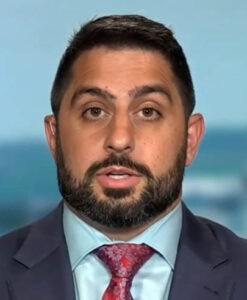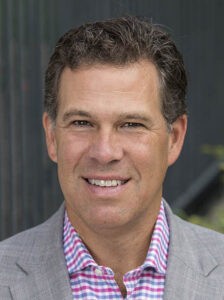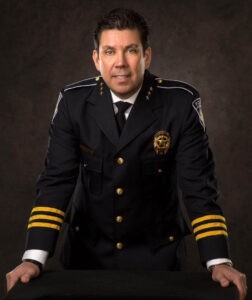The coming end to Title 42 restrictions on immigrants is good news, but its demise will highlight the more urgent need for Congress to pass meaningful immigration reform, according to a panel of business, national security and faith leaders.
In a sense, debate over the Trump administration’s controversial use of an obscure health provision to drive tens of thousands of refugees from the southern border took attention away from the more basic problems that existed before COVID and will still be there after COVID, speakers said at the April 13 discussion hosted by the Alliance for a New Immigration Coalition, or ANIC.
There remains an urgent need for Congress to enact meaningful immigration reform that addresses the nation’s economic, humanitarian, spiritual and law enforcement challenges related to migration at the U.S.-Mexico border.

Jon Baselice
“We are going to be pushing both Congress and the (Biden) administration to sit down and start working with one another because without it we are going to see these problems persist,” said panelist Jon Baselice, vice president of immigration policy for the U.S. Chamber of Commerce.
Some of the “problems” he referenced include U.S. labor and food shortages due to insufficient numbers of migrant workers being allowed into the United States.
The longer Congress refuses to act, the “bigger and harder to solve” the problems will become, he added.
Baselice was joined on the panel by Stewart Verdery, a member of the Council on National Security and Immigration; Walter Kim, president of the National Association of Evangelicals; and Andy Harvey, chief of police in Pharr, Texas, which is located on the U.S.-Mexico border. The discussion was moderated by Kristie De Peña, vice president for policy and director of immigration at the Niskanen Center, a Washington, D.C., think tank specializing in environmental, civil liberties and immigration reform issues and policy.

Kristie De Pena
De Peña said the concerns of immigration advocates have risen since the White House announced earlier this month the termination of Title 42. The policy is scheduled to end May 23, although that decision has been challenged in a recent federal lawsuit filed by Arizona, Louisiana and Missouri.
Ending Title 42 — while important — will not solve America’s broken immigration system, De Peña said. “Collectively, we are in a moment of heightened need for better border management and reform.”
That’s a sentiment shared by most Americans, she said, referencing a February survey by the National Immigration Forum that found 79% of registered voters, regardless of party affiliation, want lawmakers to engage in bipartisan efforts to improve border security, create pathways to citizenship for undocumented immigrants brought into the country as children, and provide legal avenues for migrant farm hands and other essential workers.
“We know Americans are feeling a lot of this urgency, whether it’s about immigration per se, or it’s about some of the economic concerns, the health care challenges we’re seeing, workforce shortages — these are all tangential immigration issues that we are seeing top of mind for a lot of Americans and businesses,” De Peña said. “We need solutions. The time is now to lead on solutions.”

Stewart Verdery (Photo by Ian Wagreich )
In the meantime, while Congress stalled, the Trump-era expulsion policy did little to make the nation any safer, said Verdery, who served in the Department of Homeland Security under George W. Bush.
“Title 42 was a band-aid for our broader inability to build a case management system to deal with people seeking asylum and seeking entry into the United States,” he said. “The current wave of migrants is not trying to sneak in. They are trying to turn themselves in to Customs and Border Protection or to the Border Patrol so they can have an asylum case reviewed. We need a massive infusion of immigration case officers and judges to handle appeals and effective enforcement to make sure people turn up for their hearings.”
Designing and implementing that system will take a major investment by Congress, Verdery said. “I suppose reasonable people can disagree on the exact criteria for mounting a credible asylum claim. I would probably err on the side of limiting those who are primarily economic migrants. But no matter whether you think the approval rate should be 20% or 80%, we have a broken system when both frivolous and meritorious cases take years to be resolved.”
“We have a broken system when both frivolous and meritorious cases take years to be resolved.”
And the challenges won’t go away just by talking about them, Verdery added. “It’s easy to decry a broken border, but as long as we have a more robust economy than Central American countries, we will see these same images coming across the border and now is the time to try to fix it.”

Walter Kim
Kim agreed with conservative religious opponents of uncontrolled immigration that Scripture backs the government’s responsibility to provide a secure border and to block the entry of those who would do harm. But he said Scripture simultaneously calls for compassion in offering refuge to those who are fleeing harm.
“We certainly see in the Bible that God loves and has a deep concern for the immigrant,” he added. “The issue of immigration repeatedly appears in the Bible along with a deep concern for orphans and widows as people of particular vulnerability. So clearly the Bible has this concern for foreigners living among us. So, there is an urgency as I think about the faith community that this issue of immigration reform is not simply about those residing among us who are other — they are actually us.”
Meanwhile, hundreds of thousands of Dreamers are active, valuable members of churches, Christian colleges and seminaries across the U.S., Kim said. “They contribute richly to the life of the church and academic communities. They’re indispensable. They’re a part of us.”
Nor does ending Title 42 solve the problem local law enforcement faces along the U.S.-Mexico border, Harvey said. “The possibility of Title 42 ending gives it more [of a] sense of urgency, but it’s been like that. It’s nothing new. We have been screaming at the top of our lungs for something to be done.”

Andy Harvey
One concern is for the safety of immigrants who have entered the country illegally and who are afraid to seek help when in danger, the police chief added. “What keeps me up at night is the possibility of something happening in my city and not knowing about it because people are living in fear.”
Many in law enforcement see the lack of immigration reform as a public safety issue, he added. “When people live in fear, people are less safe. In spite of what’s going on in Washington, we still have to deal with the reality of what is going on in our local communities.”
The most recent significant “immigration reform” bill passed in Congress was the Immigration Reform and Control Act of 1986, which made it illegal to hire or recruit illegal immigrants. President Barack Obama called for major reform but was blocked by then House Speaker Paul Ryan.
To find a major immigration reform passed by Congress requires looking all the way back, to 1965 and passage of the landmark Immigration and Nationality Act that created a new system favoring family reunification and skilled immigrants, rather than country quotas.
Related articles:
Majorities of all Americans want something Congress refuses to do: Meaningful immigration reform now
Once again, immigration reform gets kicked to the curb by Senate
Conservative commentator Kristol says Republicans should support immigration measures


